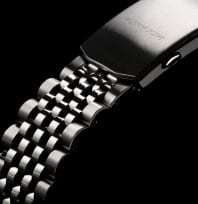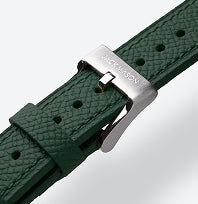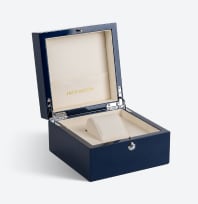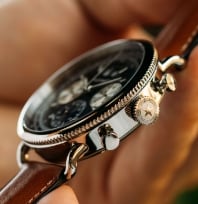There are few accessories as iconic or as storied as the wristwatch. Whether worn in the heat of battle, at the coolness of an elegant gala, or during any exciting activity that fits between the two, few pieces remain as versatile and universal as the watch.
Below, we have gathered just a few reasons why wearing a watch is essential.
1: They’re Stylish
We decided to start this list with the most obvious reason. Watches, throughout their history, have always been associated with class and sophistication. Whether worn peeking out under a suit and shirtsleeves or proudly displayed with athletic or casual wear, a watch makes a statement on the values of the wearer.
Whether you want an understated watch that speaks to a formal sensibility, or one that boldly hints towards an adventurous nature, there are plenty of case and band styles, the latter often interchangeable to a degree, to express yourself in exactly the way you desire.
With nearly a century of contemporary usage under their belt, watches have gone through enough stylistic changes that anyone can find one that suits their personal taste and wardrobe.
Whether you want a contemporary or vintage watch, or one that is either simple or packed with additional features, the perfect balance of form and function exists for everyone.
The latter of these segues perfectly into our second reason:
2: They’re Functional
While many may list “style” as the first quality of watches, the fact remains that the accessory developed out of a very real need to read the time accurately.
Many watches now have additional features, called complications, such as a stopwatch or a tachymeter which can be used to measure speed over time. Other watches, such as pilots watches or divers watches, may have built-in complications and design choices used to fit their usual operating parameters.
Some occupations and recreational habits demand specialized watches. Are dress watches mandatory to allow you to function at high-elegance affairs? No, but they certainly help you leave the impression you want.
Sport watches, on the other hand, combine style and function for those who need them the most. These watches tend to be tested at higher levels of water resistance than their regular counterparts.
Divers watches, for instance, have additional features improving the functionality, legibility, and durability of the piece underwater. Some pilots watches have a specialized crystal to ensure functionality at varying altitudes.
3: You’re a History Buff
It’s no secret that watches come backed by a rich legacy. The original portable watches appeared in the late 15th century and were worn around the belt or neck. These contraptions were highly inaccurate and could not measure minutes or seconds until a few centuries later.
Even once the issue of size and accuracy was addressed, the pocket watch was the norm for men. Wristwatches did exist but were only used as a women’s fashion accessory. Men’s wristwatches came into use initially for functional reasons rather than fashionable ones.
Improvised wristwatches first appeared during the Boer War, made by tying pocket watch cases to the wrist with a bit of string, and mass-produced men’s watches were common for soldiers during World War I.
These watches differed most strongly from their modern counterparts in two unique ways: Firstly, these watches often featured protective coverings which would hide most of the watch crystal, increasing protection while reducing legibility. Secondly, the watches used had their dials painted with radium in order to increase luminosity.
These early mechanical watches were built for function rather than style, though soon after, wristwatches would enter vogue as a fashionable, radiation-free accessory for men and women alike. When you wear a wristwatch, you evoke a history as complex as the craft of watchmaking itself.
4: You Love Quality Craftsmanship
From the beginning, watches have been appreciated for the intricate machinery allowing them to function. Even quartz watches, which feature less complex electrical mechanisms, still maintain their visual appeal.
Craftsmanship, however, is where mechanical and automatic watches shine their brightest. Though contemporary quartz watches may be slightly more accurate than their predecessors, they lack the complex interior of their counterparts.
Unlike quartz watches, which use batteries, mechanical and automatic watches both use a complex system of gears and springs in order to function. They may feature partially clear cases or casebacks to showcase this element of their design.
That internal craftsmanship is a major part of why horologists and watch connoisseurs are drawn to these types of watches. The components of mechanical watches are small and complex enough that special tools are needed to create and repair them.
Few accessories require such attention to detail. By investing in a handcrafted watch, you reject fast fashion in favor of a bespoke tradition that values high-quality accessories that are made to last.
5: You Adore Simplicity
The strength of a watch comes from the power it grants, despite taking up a small amount of real estate on your wrist. Regardless of how simple or complex your outfit or wrist gear actually is, the simple act of wearing a watch adds an eye-catching accent to any outfit.
It adds an understated elegance with a suit and tie, and a watch can also add a dash of sophistication to an otherwise casual outfit. Wearing a watch also allows you to check the time in places where having your phone out would otherwise be inappropriate, such as a theater.
6: You Want To Leave a Legacy
Unlike other accessories or articles of clothing, a watch is not just something to wear on your wrist. A watch is an investment. If properly cared for, your new watch can last for generations and turn into a treasured antique to be bequeathed to a child or loved one, or make a sentimental gift to mark an important milestone.
Antique watches gain their allure and reputation by both their age and condition, but only by maintaining a watch and continuing to pass it on across generations can it become an heirloom. What’s more, a prized watch can be engraved with important initials or a special date to add a concrete bit of family history onto your wearable.
The piece becomes more than the sum of its parts when it is imbued with the sentimentality and connection that only history can provide.
7: You Want To Be Less Dependent on Your Phone
Technology has, for better or worse, infiltrated every aspect of our life. Computers now live on our desks, in our phones, in our cars, and on our wrists. Many now use phones for the primary reason watches first became crucial: To check the time.
Regardless of how the prevalence of smartphones has improved one’s life, some may want to reduce their screen time or otherwise be less reliant on a phone for daily activities. Extensive phone usage can impact happiness and stress negatively. In particular, anxiety around phone protection may drag one down when engaged in physical or water-based activities.
Wearing a watch provides a more stylish way to check the time while ensuring you only need to use your phone for the activities you perceive as necessary.
8: You Want To Stand Out
Just like a well-polished pair of shoes or a perfectly matching tie, a watch in any context is an eye-catcher. Because a good watch is an investment, wearing one shows that you take pride in your appearance without appearing vain.
What’s more, with less than a third of people wearing watches on a daily basis, a piece of wrist jewelry helps you stand out as someone fashion-conscious in an increasingly savvy world. A watch also sends the message that you value your time enough to want to keep that information available at a glance.
9: You Want To Tell The Time
This final reason for wearing a watch is a deceptively simple one: Watches tell time.
Analog watches, in particular, tell the time in a way that is quickly becoming lost to us. Partially because of the strong visual element associated with the dial of a watch, the notion of time passing viewed in analog gains a significance that digital simply cannot create.
In a digital clock, the minutes tick on with the simple changing of a number, without creating a visible sense of progress. In an analog clock, the appearance of the second, minute, and hour hands making a circular motion gives weight to the time in the day.
It serves as a reminder not only to be productive with the time we have but that we have the remarkable power to lose ourselves in time for a while: try not to be worried about the pressing demands from our work, phone, and social media.
A Life Style
A watch, in summation, offers luxury, beauty, and legacy, and all that it asks in return is that we occasionally check the time and allow ourselves a moment for time to go unchecked.
Sources:
A Brief History of the Wristwatch I The Atlantic
The Stress of Constantly Checking Your Phone I Verywell Mind











